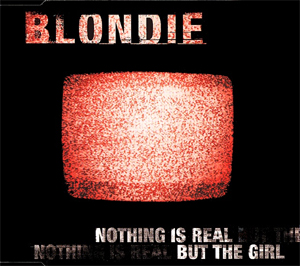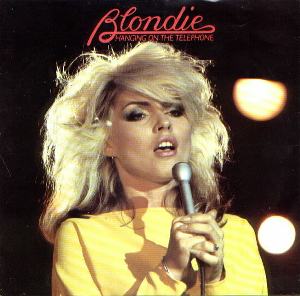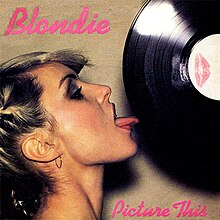
Blondie is an American rock band formed in New York City in 1974 by singer Debbie Harry and guitarist Chris Stein. The band was a pioneer in the American new wave genre and scene of the mid-1970s.

Parallel Lines is the third studio album by American rock band Blondie, released on September 23, 1978, by Chrysalis Records to international commercial success. The album reached No. 1 on the UK Albums Chart in February 1979 and proved to be the band's commercial breakthrough in the United States, where it reached No. 6 on the Billboard 200 in April 1979. In Billboard magazine, Parallel Lines was listed at No. 9 in its top pop albums year-end chart of 1979. The album spawned several successful singles, notably the international hit "Heart of Glass".

Jimmy Destri is an American musician.

"Call Me" is a song by the American new wave band Blondie and the theme to the 1980 film American Gigolo. Produced and composed by Italian musician Giorgio Moroder, with lyrics by Blondie singer Debbie Harry, the song appeared in the film and was released in the United States in early 1980 as a single. "Call Me" was No. 1 for six consecutive weeks on the Billboard Hot 100, where it became the band's biggest single and second No. 1. It also hit No. 1 in the UK and Canada, where it became their fourth and second chart-topper, respectively. In the year-end chart of 1980, it was Billboard's No. 1 single and RPM magazine's No. 3 in Canada.

The Hunter is the sixth studio album by American rock band Blondie, released on May 24, 1982, by Chrysalis Records. It was Blondie's last album of new material until 1999's No Exit. It was recorded between December 1981 and February 1982.

Blondie is the debut studio album by American rock band Blondie, released in December 1976 by Private Stock Records.

"(I'm Always Touched by Your) Presence, Dear" is a song by the American band Blondie, from their 1978 album Plastic Letters. Written by former Blondie bassist Gary Valentine, the song was based on the telepathic connections that Valentine believed he experienced with his girlfriend, journalist Lisa Jane Persky, while on tour. Though Valentine had recently left the band, drummer Clem Burke convinced the band to record the song for Plastic Letters.

"One Way or Another" is a song by American new wave band Blondie from their 1978 album Parallel Lines. Lyrically, the song was inspired by Blondie frontwoman Deborah Harry's experience with a stalker in the early 1970s, an incident which forced her to move away from New Jersey. The song's music was composed by bassist Nigel Harrison, who introduced the Ventures-influenced track to keyboardist Jimmy Destri.

"Heart of Glass" is a song by the American new wave band Blondie, written by singer Debbie Harry and guitarist Chris Stein. It was featured on the band's third studio album, Parallel Lines (1978), and was released as the album's third single in January 1979 and reached number one on the charts in several countries, including the United States and the United Kingdom.

Eat to the Beat is the fourth studio album by American rock band Blondie, released on September 28, 1979, by Chrysalis Records. The album was certified Platinum in the United States, where it spent a year on the Billboard 200. Peaking at No. 17, it was one of Billboard's top 10 albums of 1980. It also reached No. 1 on the UK Albums Chart in October 1979 and has been certified Platinum by the British Phonographic Industry (BPI) and the Recording Industry Association of America (RIAA).

"Atomic" is a song by American rock band Blondie from their fourth studio album, Eat to the Beat (1979). Written by Debbie Harry and Jimmy Destri and produced by Mike Chapman, the song was released in February 1980 as the album's third single.

"Rapture" is a song by American rock band Blondie from their fifth studio album Autoamerican (1980). Written by band members Debbie Harry and Chris Stein, and produced by Mike Chapman, the song was released as the second and final single from Autoamerican on January 12, 1981, by Chrysalis Records. Musically, "Rapture" is a combination of new wave, disco and hip hop with a rap section forming an extended coda.

"Nothing Is Real but the Girl" is a song by American rock band Blondie. Written by the band's keyboardist Jimmy Destri, it was the second single released from their seventh album, No Exit (1999), on May 31, 1999. The single peaked at number 26 in the United Kingdom and number 89 in Germany.

"Dreaming" is a song by American new wave band Blondie. Released in 1979, the song was the opening track from their fourth album Eat to the Beat. Written by guitarist Chris Stein and singer Debbie Harry and partially inspired by ABBA's "Dancing Queen," the song also features an active drum performance by drummer Clem Burke, who did not expect the final recording to feature his busy drum track.

The Complete Picture: The Very Best of Deborah Harry and Blondie is a greatest hits album released on March 4, 1991, by Chrysalis Records. It contained all of Blondie's highest-charting singles such as "Heart of Glass", "Sunday Girl", "The Tide Is High", "Atomic", and "Call Me", as well as some of Deborah Harry's solo singles, including the UK top-10 single "French Kissin' in the USA".

"Sunday Girl" is a song recorded by the American new wave band Blondie, from the band's 1978 album Parallel Lines. Written by guitarist Chris Stein, the song was inspired by Debbie Harry's cat, who was named Sunday Man—the cat had recently run away, inspiring the song's "plaintive" nature.

Blonde and Beyond is a compilation album of recordings by Blondie released on Chrysalis Records in 1993.

Deborah Ann Harry is an American singer, songwriter and actress, best known as the lead vocalist of the band Blondie. Four of her songs with the band reached No. 1 on the US charts between 1979 and 1981.

Panic of Girls is the ninth studio album by the American rock band Blondie. It was the band's first album of new material in nearly 8 years, since 2003's The Curse of Blondie. The album was first released digitally on May 30, 2011, followed by physical releases in various formats later.

"Hanging on the Telephone" is a song written by Jack Lee. The song was released in 1976 by his short-lived US West Coast power pop band the Nerves; in 1978, it was recorded and released as a single by American new wave band Blondie.




















